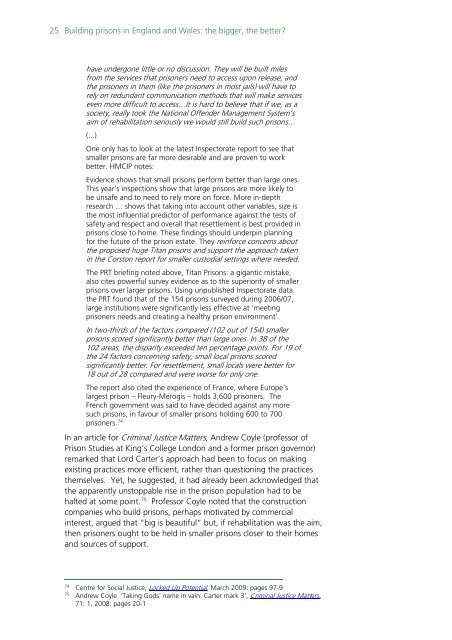Building prisons in England and Wales the bigger the better?
HoC-Building-Prisons-in-England-and-Wales_The-Bigger-the-Better_Feb16_Briefing-05646
HoC-Building-Prisons-in-England-and-Wales_The-Bigger-the-Better_Feb16_Briefing-05646
You also want an ePaper? Increase the reach of your titles
YUMPU automatically turns print PDFs into web optimized ePapers that Google loves.
25 <strong>Build<strong>in</strong>g</strong> <strong>prisons</strong> <strong>in</strong> <strong>Engl<strong>and</strong></strong> <strong>and</strong> <strong>Wales</strong>: <strong>the</strong> <strong>bigger</strong>, <strong>the</strong> <strong>better</strong>?<br />
have undergone little or no discussion. They will be built miles<br />
from <strong>the</strong> services that prisoners need to access upon release, <strong>and</strong><br />
<strong>the</strong> prisoners <strong>in</strong> <strong>the</strong>m (like <strong>the</strong> prisoners <strong>in</strong> most jails) will have to<br />
rely on redundant communication methods that will make services<br />
even more difficult to access…It is hard to believe that if we, as a<br />
society, really took <strong>the</strong> National Offender Management System’s<br />
aim of rehabilitation seriously we would still build such <strong>prisons</strong>…<br />
(...)<br />
One only has to look at <strong>the</strong> latest Inspectorate report to see that<br />
smaller <strong>prisons</strong> are far more desirable <strong>and</strong> are proven to work<br />
<strong>better</strong>. HMCIP notes:<br />
Evidence shows that small <strong>prisons</strong> perform <strong>better</strong> than large ones.<br />
This year’s <strong>in</strong>spections show that large <strong>prisons</strong> are more likely to<br />
be unsafe <strong>and</strong> to need to rely more on force. More <strong>in</strong>-depth<br />
research … shows that tak<strong>in</strong>g <strong>in</strong>to account o<strong>the</strong>r variables, size is<br />
<strong>the</strong> most <strong>in</strong>fluential predictor of performance aga<strong>in</strong>st <strong>the</strong> tests of<br />
safety <strong>and</strong> respect <strong>and</strong> overall that resettlement is best provided <strong>in</strong><br />
<strong>prisons</strong> close to home. These f<strong>in</strong>d<strong>in</strong>gs should underp<strong>in</strong> plann<strong>in</strong>g<br />
for <strong>the</strong> future of <strong>the</strong> prison estate. They re<strong>in</strong>force concerns about<br />
<strong>the</strong> proposed huge Titan <strong>prisons</strong> <strong>and</strong> support <strong>the</strong> approach taken<br />
<strong>in</strong> <strong>the</strong> Corston report for smaller custodial sett<strong>in</strong>gs where needed.<br />
The PRT brief<strong>in</strong>g noted above, Titan Prisons: a gigantic mistake,<br />
also cites powerful survey evidence as to <strong>the</strong> superiority of smaller<br />
<strong>prisons</strong> over larger <strong>prisons</strong>. Us<strong>in</strong>g unpublished Inspectorate data<br />
<strong>the</strong> PRT found that of <strong>the</strong> 154 <strong>prisons</strong> surveyed dur<strong>in</strong>g 2006/07,<br />
large <strong>in</strong>stitutions were significantly less effective at ‘meet<strong>in</strong>g<br />
prisoners needs <strong>and</strong> creat<strong>in</strong>g a healthy prison environment’.<br />
In two-thirds of <strong>the</strong> factors compared (102 out of 154) smaller<br />
<strong>prisons</strong> scored significantly <strong>better</strong> than large ones. In 38 of <strong>the</strong><br />
102 areas, <strong>the</strong> disparity exceeded ten percentage po<strong>in</strong>ts. For 19 of<br />
<strong>the</strong> 24 factors concern<strong>in</strong>g safety, small local <strong>prisons</strong> scored<br />
significantly <strong>better</strong>. For resettlement, small locals were <strong>better</strong> for<br />
18 out of 28 compared <strong>and</strong> were worse for only one.<br />
The report also cited <strong>the</strong> experience of France, where Europe’s<br />
largest prison – Fleury-Merogis – holds 3,600 prisoners. The<br />
French government was said to have decided aga<strong>in</strong>st any more<br />
such <strong>prisons</strong>, <strong>in</strong> favour of smaller <strong>prisons</strong> hold<strong>in</strong>g 600 to 700<br />
prisoners. 74<br />
In an article for Crim<strong>in</strong>al Justice Matters, Andrew Coyle (professor of<br />
Prison Studies at K<strong>in</strong>g’s College London <strong>and</strong> a former prison governor)<br />
remarked that Lord Carter’s approach had been to focus on mak<strong>in</strong>g<br />
exist<strong>in</strong>g practices more efficient, ra<strong>the</strong>r than question<strong>in</strong>g <strong>the</strong> practices<br />
<strong>the</strong>mselves. Yet, he suggested, it had already been acknowledged that<br />
<strong>the</strong> apparently unstoppable rise <strong>in</strong> <strong>the</strong> prison population had to be<br />
halted at some po<strong>in</strong>t. 75 Professor Coyle noted that <strong>the</strong> construction<br />
companies who build <strong>prisons</strong>, perhaps motivated by commercial<br />
<strong>in</strong>terest, argued that “big is beautiful” but, if rehabilitation was <strong>the</strong> aim,<br />
<strong>the</strong>n prisoners ought to be held <strong>in</strong> smaller <strong>prisons</strong> closer to <strong>the</strong>ir homes<br />
<strong>and</strong> sources of support.<br />
74<br />
Centre for Social Justice, Locked Up Potential, March 2009: pages 97-9<br />
75<br />
Andrew Coyle 'Tak<strong>in</strong>g Gods' name <strong>in</strong> va<strong>in</strong>: Carter mark 3', Crim<strong>in</strong>al Justice Matters,<br />
71: 1, 2008: pages 20-1


